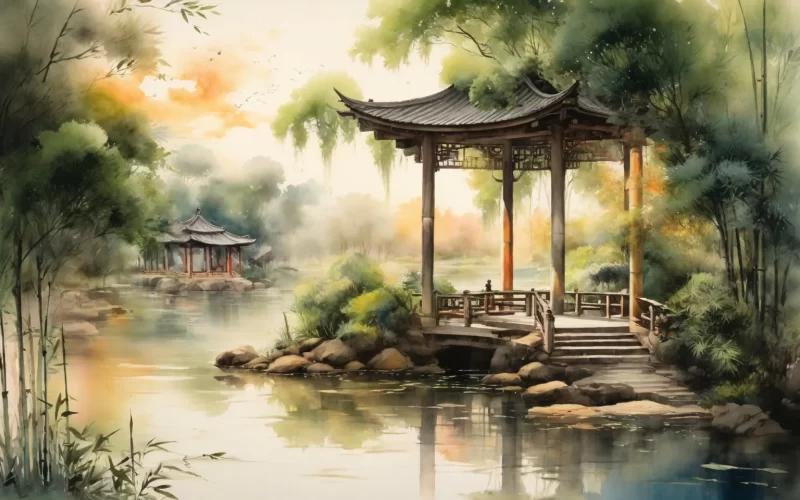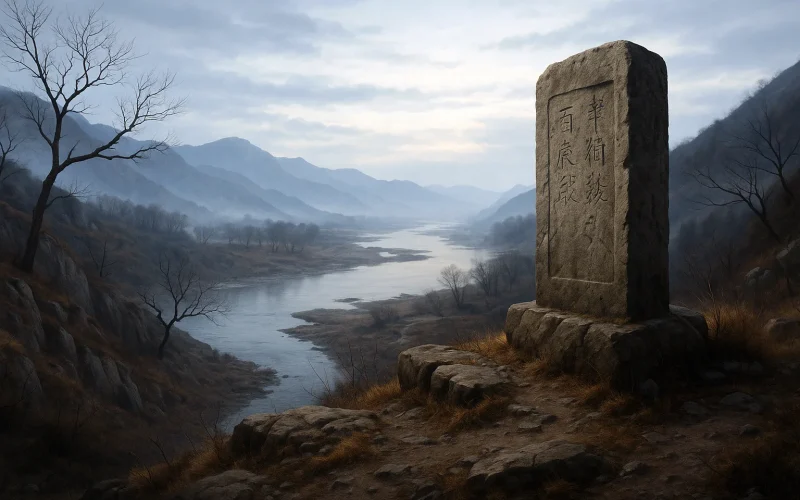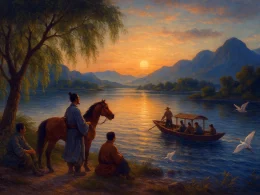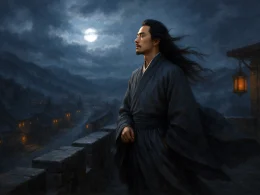A bell in the mountain-temple sounds the coming of night.
I hear people at the fishing-town stumble aboard the ferry,
While others follow the sand-bank to their homes along the river.
...I also take a boat and am bound for Lumen Mountain --
And soon the Lumen moonlight is piercing misty trees.
I have come, before I know it, upon an ancient hermitage,
The thatch door, the piney path, the solitude, the quiet,
Where a hermit lives and moves, never needing a companion.
Original Poem
「夜归鹿门歌」
孟浩然
山寺钟鸣昼已昏, 渔梁渡头争渡喧。
人随沙路向江村, 余亦乘舟归鹿门。
鹿门月照开烟树, 忽到庞公栖隐处。
岩扉松径长寂寥, 惟有幽人自来去。
Interpretation
Composed after Meng Haoran's resignation from office at forty, this poem reflects his retreat to his hometown Xiangyang following career disappointments. Residing near Lumen Mountain where Eastern Han recluse Pang Degong once lived, the poet transforms a nocturnal journey into an allegory of spiritual homecoming, contrasting worldly bustle with reclusive serenity.
First Couplet: "山寺钟鸣昼已昏,渔梁渡头争渡喧。"
Shān sì zhōng míng zhòu yǐ hūn, yú liáng dù tóu zhēng dù xuān.
Temple bells toll dusk on mountain; Fisher's Pier bustles with crossing cries.
The opening juxtaposes sacred sound ("temple bells") against secular clamor ("crossing cries"), establishing the poem's central dichotomy between spiritual and mundane realms.
Second Couplet: "人随沙路向江村,余亦乘舟归鹿门。"
Rén suí shā lù xiàng jiāng cūn, yú yì chéng zhōu guī Lùmén.
Folk trace sandy paths to riverside homes; I too board my boat for Lumen's slopes.
Parallel movements diverge in purpose - the crowd's earthly return contrasts with the poet's transcendental destination, foreshadowing his ultimate solitude.
Third Couplet: "鹿门月照开烟树,忽到庞公栖隐处。"
Lùmén yuè zhào kāi yān shù, hū dào Páng gōng qī yǐn chù.
Lumen's moonlight parts mist-veiled trees - Suddenly I reach Pang's hermitage.
Luminous revelation ("moonlight parts") leads to epiphanic arrival ("suddenly reach"), merging physical journey with historical and spiritual awakening.
Fourth Couplet: "岩扉松径长寂寥,惟有幽人自来去。"
Yán fēi sōng jìng cháng jì liáo, wéi yǒu yōu rén zì lái qù.
Stone gate and pine path breathe perpetual hush - Only secluded souls come and go.
The conclusion crystallizes reclusive ideals - the "perpetual hush" of nature's sanctuary and the "secluded souls" who move freely beyond social constraints.
Holistic Appreciation
This nocturnal pilgrimage progresses through four spiritual stages: hearing sacred/secular sounds (couplet 1), choosing the transcendent path (2), achieving enlightenment (3), and inhabiting the reclusive state (4). The moonlit mountain becomes more than physical destination - it's the crystallization of Meng's philosophical choice to trade human noise for nature's silence, temporal striving for eternal calm. Historical memory (Pang Degong) merges with present experience, validating the poet's decision through ancestral precedent.
Writing Characteristics
- Dualistic framework: Counterpoints worldly/sacred, crowd/individual
- Luminous imagery: Moonlight as spiritual illumination
- Historical resonance: Pang Degong's legacy as ethical anchor
- Spatial symbolism: Vertical mountain ascent versus horizontal river crossings
Insights
The poem maps an alternative geography where true navigation means moving inward rather than outward. Meng demonstrates how physical journeys can become rites of passage when imbued with intentionality - his night voyage transforms into existential choice. For contemporary readers, this "mountain return" offers metaphors for digital-age disconnection: the need to periodically mute collective chatter and recalibrate to inner rhythms. The work ultimately suggests that homecoming isn't about place, but about returning to one's essential nature.
Poem translator
Kiang Kanghu
About the poet

Meng Haoran (孟浩然), 689 - 740 AD, a native of Xiangyang, Hubei, was a famous poet of the Sheng Tang Dynasty. With the exception of one trip to the north when he was in his forties, when he was seeking fame in Chang'an and Luoyang, he spent most of his life in seclusion in his hometown of Lumenshan or roaming around.












